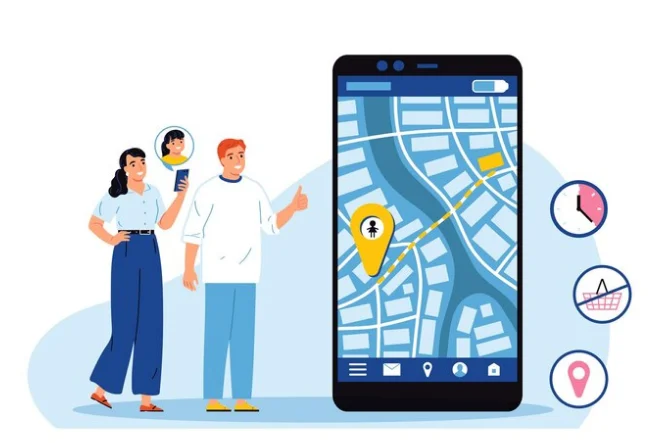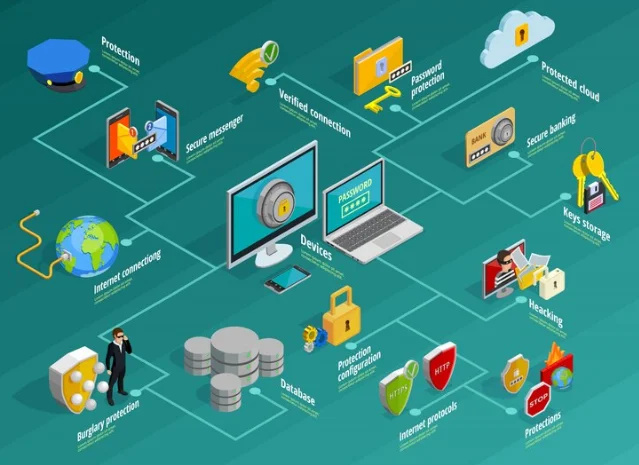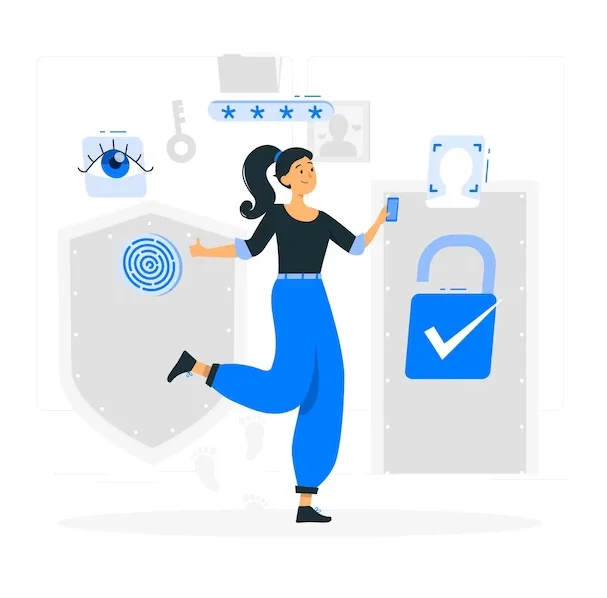In today’s interconnected world, staying safe online is crucial for both individuals and businesses. Many people use web proxies as a way to enhance their online security and privacy.
It’s essential to note that not all proxies are created equal, and there are differences between paid and free proxies.
In this article, I’ll explore role of proxies in online security with the help of features of proxies, highlight how paid proxies offer improvements over free ones, and discuss situations where using proxies is beneficial.
How Do Proxies Enhance Online Security and Privacy?
Using paid proxy servers offers benefits like anonymity and security, and here’s how they ensure these advantages:
1. Prevention of Tracking:

Issue: Websites and advertisers often track online activities using various digital methods like cookies, tracking pixels, and fingerprinting.
How Proxies Help: Paid proxies thwart these trackers by enabling connections through different IP addresses. This practice keeps your preferences and data private, making it difficult for websites to monitor your online behavior.
2. Security Over Public Networks:

Issue: Public networks, such as Wi-Fi in cafes or airports, pose cybersecurity risks. Eavesdroppers can intercept data transmissions over these networks.
How Proxies Help: Paid proxy servers address this concern by employing encryption capabilities. Encryption ensures that even if someone intercepts your data, they won’t be able to decipher it, enhancing overall security on public networks.
3. Rotating Proxies:

Issue: Web proxies provide privacy by allowing users to mask their IP addresses. However, certain tasks, like web scraping, can lead to IP bans.
How Proxies Help: Paid proxy servers offer automated rotating proxies. Instead of relying on a single IP address, these servers rotate through multiple IPs, distributing tasks among different servers. This rotation helps evade IP bans, ensuring a continuous and secure browsing experience.
Key Features of Proxies

Proxies act as middlemen between your device and the internet, and they come with specific features to perform their functions. Here are some key features of proxies:
- Geo-location masking: Proxies can make it seem like you’re connecting from a different location, helping you access content restricted to that area. This feature is useful for bypassing digital censorship and accessing geo-restricted content.
- Anonymity: Proxies change your IP address and location, providing anonymity by preventing websites from tracking your activity. Paid proxies, especially elite ones, offer the highest level of anonymity.
- Access control: Paid proxies can grant or restrict access to specific content. This feature is handy for companies managing their employees’ internet use during office hours or for parents controlling their children’s online activities.
- Encryption: While not all proxies offer encryption, some paid proxy servers encrypt user data, adding an extra layer of protection. The quality of encryption can vary among different paid proxies.
- Caching of web pages: Web proxies can store frequently visited pages, allowing them to load faster on subsequent visits. This caching feature enhances browsing speed and efficiency.
Understanding these features helps users make informed choices when selecting proxies based on their specific needs and preferences.
When to Use Proxies?
Paid proxy servers prove especially advantageous in various scenarios, catering to specific needs and challenges. Here are some situations where proxies offer significant benefits:
- Remote Work: With the rise of hybrid and remote work, companies need to secure online resources and connections for their dispersed workforce.
- Proxy Solution: Dedicated paid proxy servers provide a secure internet connection, allowing companies and freelancers to access resources remotely without compromising security.
- Competitive Research: Businesses expanding into new markets engage in competitive research, but anonymity is crucial during this process.
- Proxy Solution: Paid proxy servers offer a perfect tool for conducting research without exposing the identity of the researcher, ensuring a discreet and effective competitive analysis.
- Accessing Restricted Content: Geo-restrictions often limit access to certain online content based on geographical locations, leading to unfair limitations.
- Escaping Censorship: Freedom of speech is not universally upheld, and some regions impose restrictions on expressing opinions or accessing certain platforms.
Common Issues with Browsers and IP Addresses
When we use the internet, sometimes we face problems with our browsers and IP addresses. These problems can be annoying and make it hard to do things online.
It’s important to know about these common issues and how to fix them for a better and safer internet experience.
One common issue is not being able to open a website because of problems with your IP address.
This can happen if your settings are wrong or if there’s a conflict with other network settings. When this happens, you might not be able to connect to the internet or visit websites.
To fix these loading issues, you can try a few things. First, check if your device’s IP address is correct for the network you’re using. You can do this by using a command in the command prompt or terminal, depending on your computer.
If the IP address looks good, the next step is to clear your browser’s cache and cookies. These are files that can build up over time and cause problems with loading websites.
Clearing them not only helps with IP address issues but also makes your browser work better overall.
Another thing you can do is turn off any proxy settings in your browser. Proxies are like middlemen between your device and the internet, but sometimes, they can cause problems with IP addresses.
By turning them off, you can see if they’re causing the issue.
If these steps don’t work, you can try resetting your router or modem. Just unplug it for a few seconds and then plug it back in. This can refresh the network settings and maybe fix any problems.
If nothing works, you might need to contact your internet service provider (ISP) for help. They have more advanced tools to find and fix IP address issues.
By doing these steps, you can fix common problems with browsers and IP addresses. This helps you have a better internet experience and keeps you safer online by fixing any issues with your IP address.
Best Practices for Secure Browsing with Proxies
To make sure your online browsing is secure when using proxies, there are some best practices you should follow.
These practices not only boost online security but also safeguard the privacy of your online activities. By following these tips, you can optimize your proxy settings for a safer online experience.
1. Choose a Reputable Proxy Provider:

Select a proxy provider with a good reputation and reliable services.
Read customer reviews and do thorough research before making a decision.
Choose providers that prioritize user privacy and implement strong security measures.
2. Configure Proxy Settings Correctly:
Manually set up proxies in your browser’s network settings or preferences.
Enter the correct IP address and port number provided by your proxy service.
Incorrect configuration can lead to connection issues or compromise your security.
3. Regularly Update Proxy Software:

Keep your proxy software or browser extensions up-to-date.
Updates often address security vulnerabilities and enhance performance.
4. Use Multiple Proxies for Different Purposes:
Consider using separate proxies for general browsing and sensitive activities.
Minimize the risk of data breaches by segregating different types of online tasks.
5. Enable Encryption:

Choose proxies that offer encryption options, such as SSL or TLS.
Encryption ensures secure transmission of data between your device and visited websites.
6. Monitor Browsing Activity:
Regularly check for any suspicious behavior or unusual network activity.
Report any discrepancies or unauthorized access attempts to your proxy provider.
7. Exercise Caution in Online Transactions:
Be cautious when sharing personal information or engaging in transactions.
Proxies enhance security but do not guarantee complete protection against all threats.
Verify the authenticity of websites before entering sensitive data and use additional security measures like two-factor authentication.
Quick Links:
- The Risks of Not Hiding Your IP Address
- How to Get Around an IP Ban?
- Different Types of Proxies And Their Uses
- Is Instagram’s IP blocked?
FAQs
Are all proxies created equal in terms of security?
No, not all proxies offer the same level of security. There are different types of proxies, such as HTTP proxies, SOCKS proxies, and transparent proxies, each serving different purposes and offering varying degrees of anonymity and security. For instance, HTTP proxies are suitable for web browsing but do not encrypt your data, whereas SOCKS proxies are more versatile and secure, supporting various types of traffic beyond just web pages.
How do I choose the right proxy for my needs? 🛠️🔍
Consider the following when choosing a proxy: Purpose: Decide whether you need it for privacy, accessing blocked content, or both. Security: Look for proxies that offer high levels of encryption and data protection. Reputation: Choose providers with positive reviews and a track record of reliability. Speed and Reliability: Ensure the proxy service is fast enough for your needs and offers consistent uptime.
Are all proxy servers secure? 🔒
Not all proxy servers offer the same level of security. While some proxies provide strong encryption and data protection, others might not be as reliable, potentially exposing your data to third parties. It's crucial to choose a reputable proxy provider to ensure maximum security.
Can using a proxy server help me access blocked content? 🌍🔓
Yes! Proxy servers can bypass geographical restrictions and censorship by masking your real IP address with one from a different location. This allows you to access content and websites that are otherwise blocked in your region.
Conclusion
Thus, we have seen that proxies serve as a versatile tool, not just for accessing content from different locations but also for enhancing online security and more.
There are various types of paid proxy servers readily available for purchase. In conclusion, investing in a paid proxy is a wise choice to ensure both online security and anonymity.
